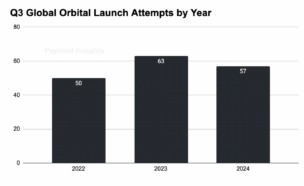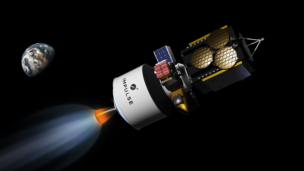The looming departure of national security space champions from Capitol Hill is expected to leave a vacuum as the Space Force approaches its third birthday, but experts say more junior members are waiting in the wings for their shot to drive military space policy.
One of the community’s biggest losses is Rep. Jim Cooper (D-TN), who announced that he would not run for reelection after redistricting in Nashville.
Cooper, who is the chair of the House Armed Services Committee [HASC] strategic forces panel, has been a longtime champion for national security priorities in orbit, including calling for the establishment of a space-focused branch of the military years before former President Donald Trump broached the idea of a Space Force.
“I’m very proud of the role [HASC Ranking Member Rep.] Mike Rogers and I played in starting the Space Force years before Trump knew about it or showed any interest,” Cooper said in an exit interview with Payload. “That’s really the only reason it ended up passing Congress. If it had been a Trump win, it never would have had the momentum.”
Cooper said he is often called “Space Force’s best friend and toughest critic.” After fighting for the establishment of a space service, Cooper publicly pushed the service to stay lean, be agile, and foster innovation. Most recently, he urged the service to put more emphasis on technology and speed than on uniforms and songs.
He may be leaving Congress in December, but Cooper isn’t ready to leave the space world just yet.
“I always want to remain involved in space, but I’m not sure what the future holds yet,” he said, adding that he has been considering post-Congress careers in investment banking, business, and teaching “pretty seriously” in addition to penning a book about the Space Force.
A space brain drain
Cooper is far from the only seasoned military space hand who will be leaving Congress in 2023. Alabama is losing two big supporters of its space industry, with the departure of Sen. Richard Shelby (R-AL), the top Republican on the subcommittee that oversees defense spending, and Rep. Mo Brooks (R-AL), a longtime ally of United Launch Alliance, who lost a primary in his bid to fill Shelby’s vacant seat.
Other members of the national security space subcommittees that are leaving Congress at the end of the year include Rep. James Langevin (D-RI) and Rep. Liz Cheney (R-WY).
“I do think it’s a loss,” said Kari Bingen, director of CSIS’s Aerospace Security Project and a former HASC staffer. “If the House flips and Ranking Member Rogers becomes chairman, while it would be phenomenal to have him in such a leadership position as one of the grandfathers of the Space Force, his bandwidth will be increasingly consumed with other national security issues.”
With the looming absence of some of its most outspoken congressional advocates, the Space Force will need to boost its outreach on Capitol Hill to ensure lawmakers are up to speed and able to help the new service with any new authorities and policies it may need, Bingen added.
“The Space Force will have work ahead of it to educate members of Congress on space issues, capabilities, programs and resources. They’re losing some of their bigger supporters,” she said. “Space Force will need knowledgeable and savvy members who can help them but also hold their feet to the fire and keep them focused.”
The changing of the guard among national security space voices on Capitol Hill will also coincide with a major shakeup happening in the Pentagon, as Gen. Jay Raymond, the Space Force’s first chief of space operations, handed the reins to his successor, Gen. Chance Saltzman, on Nov. 2.
Some prominent lawmakers who have worked on civil space issues have also already announced they are leaving Congress, including Rep. Eddie Bernice Johnson (D-TX), the chair of the House Science, Space and Technology Committee; Rep. Ed Perlmutter (D-CO), who is NASA’s top champion on the Hill for Mars missions; and Rep. Peter DeFazio (D-OR), who has played a role in the regulation of commercial space launches as chair of the House Transportation and Infrastructure Committee.
One of the biggest questions ahead of the election is whether Republicans will win control of the House and Senate.
But while a change in majority would mean new faces in leadership, experts predict it’s unlikely to affect the widespread, bicameral, and bipartisan support for military space in Congress, especially as China continues to invest in its own space program as well as counter-space capabilities to threaten American satellites.
“The threat that the Space Force was developed to address has not gone away. If anything it’s become more apparent to leadership, to stakeholders of its reality and the need to address it. Our sense is we’re going to continue to see strong bipartisan support,” said Mike French, vice president for space systems at the Aerospace Industries Association.
If Republicans do win control of the House, Rep. Doug Lamborn (R-CO) is widely expected to become chair. During debate on the fiscal 2023 National Defense Authorization Act, he successfully pushed for several space amendments, including establishing a Space National Guard and asking the Pentagon for its plan on servicing and refueling spacecraft in orbit.
“Space is in good hands with Doug Lamborn,” Cooper said.
It’s not clear yet who would step up to be the top Democrat on the strategic forces subcommittee. Neither Sen. Angus King (I-VT) nor Sen. Deb Fischer (R-NE), the chair and ranking member of the Senate Armed Services Strategic Forces Subcommittee, is up for election this year, but the leadership of the committee could still change in early 2023.
Congress’s to-do list in 2023
Cooper highlighted several issues he believes Congress should make a top priority in the new year, including pushing the Commerce Department to more quickly take over the Pentagon’s space tracking mission. This effort will take oversight from more than just the military committees on Capitol Hill, since the civilian Commerce Department is involved.
“Getting Congress to behave is a tall order because our jurisdictions are ancient, they’re arcane, and they resist any change,” Cooper said. “I think it could be a complex fight getting Commerce to take the mandate it already got and not redo everything.”
Cooper’s other top space concerns include the existence of “choke points” at launchpads that are making responsive launch more difficult, the danger of new technologies falling into China’s hands without better cybersecurity at commercial launch companies, and the need for more mature space doctrine that can dictate the US response to an attack in space regardless of who is in the White House.
But overall, he urged lawmakers to continue to make space a priority because of the critical role it plays in national security and maintain a focus that he has sought to foster.
“Congress has got to get its act together. Even in my subcommittee, space for years has been an afterthought. Now it’s a central player,” he said. “That in a sense is one of the major accomplishments…We took space from a fringe subject…and made military space a mainstream defense topic.”
The next generation of space leaders
It’ll be up to new and emerging space voices to drive debates around these issues on Capitol Hill in the new year.
One industry executive, who requested anonymity to speak freely, named Rep. Salud Carbajal (D-CA), whose district includes Vandenberg Space Force Base, a “natural space champion who is starting to take the mic more on space issues.” Both Bingen and Cooper also dropped Carbajal’s name when asked about mid-career members to watch in the space realm.
Other Democratic space-minded members to watch on the strategic forces subcommittee in the new Congress, according to the industry executive, are Rep. Jason Crow (D-CO), who represents Buckley Space Force Base and has a proven track record of bipartisanship working with Lamborn; and Rep. Steven Horsford (D-NV), who successfully pushed an NDAA amendment that boosted the Space Force’s funding for tactically responsive launch. Bingen also pointed to Rep. Seth Moulton (D-MA), a Marine Corps veteran who said while running for president in 2019 that he’d give alien invaders burgers and beer to kickstart diplomacy.
If Republicans win the House and Rogers becomes HASC chair, more junior GOP members would need to step up to fill the void left in space as Rogers focuses more time on broader national security issues. Bingen said Rep. Michael Waltz (R-Fla.), who led the effort to bring US Space Command to Florida, could be an important player.
But the growth of the Space Force means oversight of the new service will extend beyond just the strategic forces subcommittee, which handles national security space issues. Some of the biggest questions surrounding the Space Force right now, including whether the Defense Department should establish a Space National Guard and how the service can allow personnel to flex from part-time to full-time to tap into new talent pools, will likely be handled by the personnel subcommittee, the industry executive said.
The executive also sees a lack of a space champion in the Senate since Sen. Bill Nelson (D-FL), who served on the committees that oversee both national security and civil space missions, departed to become NASA administrator.
Some possible names to watch include Sen. Roger Wicker (R-MS), who has major space interests in his state and is expected to become the top Republican on the Senate Armed Services Committee; Sen. Mark Kelly (D-AZ), a former astronaut locked in a competitive race for re-election who serves on the Senate Armed Services Committee; Sen. Kevin Cramer (R-ND), whose home state will host the Space Development Agency’s primary operations center, as well as senators from Alabama and Colorado, two states with major space industries and bases.
Even without someone publicly fighting for national security space in the Senate, officials were quick to point out that Congress has been overwhelmingly supportive of the Pentagon’s space mission and has consistently met or surpassed the Space Force’s budget requests.
“The Space Force has enjoyed strong bipartisan support, and I credit Mr. Rogers and Mr. Cooper with leading the way on that,” Bingen said. “I do hope that bipartisan support is sustained. Space is not a political issue.”




